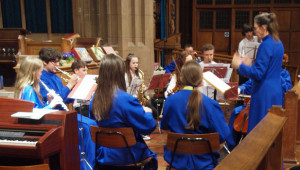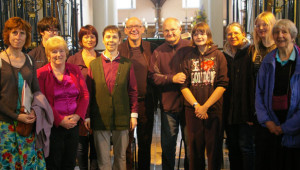Programme note for the ‘Jamaican Canticles’
This setting of the Magnificat and Nunc Dimittis, the canticles sung during evening prayer, is characterised by the exuberant syncopated dance rhythms of the Caribbean. This is particularly evident in the Gloria which is sung at the end of both canticles. The calypso rhythm continues even in the serene mood of the Nunc dimittis.
The composer, Bryan Kelly (b 1934), wrote this setting for David Hill and the choristers of Winchester Cathedral. The original version is for upper voices and organ. In this arrangement it is used during so called treble services at cathedrals where a full choral evensong is sung every day but the lay clerks may not be available. The lay clerks are adults, usually men, who sing the alto, tenor and bass parts. Many English composers – among others Malcolm Archer, Herbert Howells and Howard Goodall – have set the canticles for treble voices.
St Barbara’s choir will sing the SATB arrangement in which the upper and lower voices often double up. Some passages have been expanded into three or four individual parts. The simplicity of the two part sections of the Magnificat reflect particularly well the strength of Mary’s joy in God’s favour. The Magnificat ends with the upper and lower voices dividing into three parts each to sing in a mood of awed wonder of God’s promise of mercy and help to Abraham and his descendants.
Bryan Kelly studied with Nadia Boulanger and Herbert Howells. He was influenced by 20th century French composers and his music often contains striking rhythmic effects. He taught at the Royal Scottish Academy of Music and then, for 22 years, at the Royal College of Music. More recently, he has developed a career in Egypt as accompanist and teacher of orchestration, has worked at the Cairo Opera and taken part in projects sponsored by the American University in Cairo.





